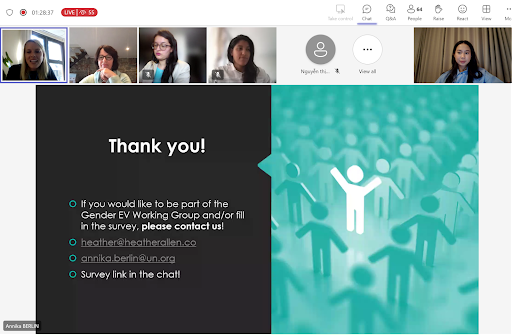March 27, 2024
ITDP Indonesia Emphasized the Significance of Gender Data collection in Indonesia at UNEP’s “E-Mobility as a Driver for Change” Event

Kasih Maharani Riwina Sabandar, Inclusive Urban Planning Associate I ITDP Indonesia, spoke in the webinar “E-Mobility as a Driver for Change: Using Data for a Gender Transformative and Just Transition to Electric Mobility” organized by The United Nations Environment Programme (UNEP) on March 13, 2024. Representatives from Vietnam, Uganda, Kenya, and Colombia also attended the webinar.
Kasih delivered a presentation on “Mapping the Gender Landscape: Indonesia’s E-Mobility,” consisting of gender dynamics in mobility, women in the e-mobility workforce, and gender-targeted initiatives by Transjakarta. Kasih added the preliminary findings of the study from the three points as follows:
- Differences in travel preferences exist, with more women primarily relying on public transportation, taking shorter trips, and having more diverse travel objectives due to being the main caregiver.
- Limited access to private vehicles among women, especially those from low-income households, contributes to their reliance on walking, cycling, and public transportation.
- Gender Disparities exist within the mobility sector with lower female representation, particularly in operational and technical roles, and individuals with lower education.
- Lack of gender diversity in leadership positions in e-mobility decision-making processes.
Kasih also explained the recommendations from the initial findings, which consisted of the following:
- Mainstream the collection of gender-disaggregated data on travel patterns to better understand women’s unique transportation needs and inform gender-inclusive transportation planning.
- Improve accessibility and safety features in sustainable transportation systems to accommodate the needs of women.
- Promoting gender-inclusive recruitment and retention strategies within TransJakarta, e-mobility sectors, and related institutions (including higher education) to address workforce gender disparities.
- Encourage more excellent representation of women in leadership positions and entrepreneurship and decision-making processes, including ensuring policies that promote women’s entrepreneurship and provide skills training and mentorship programs.
